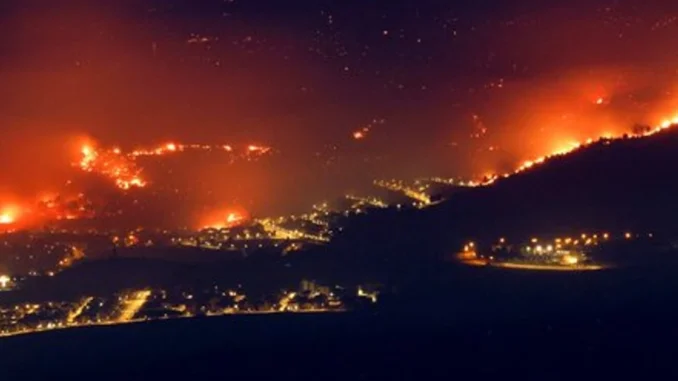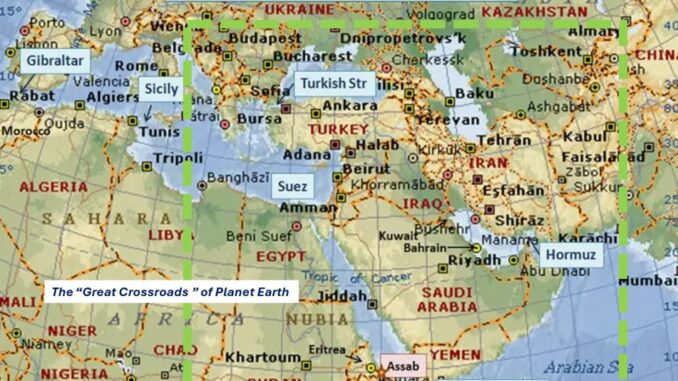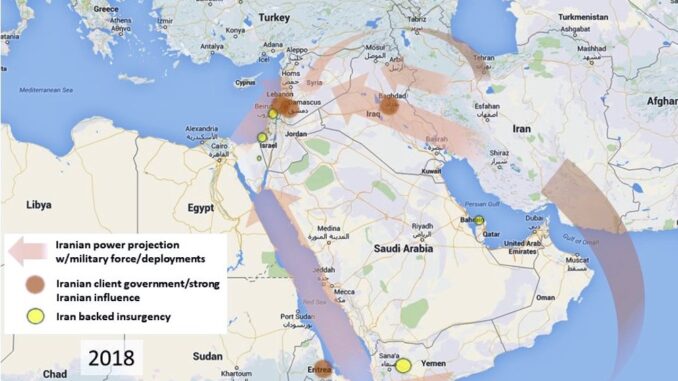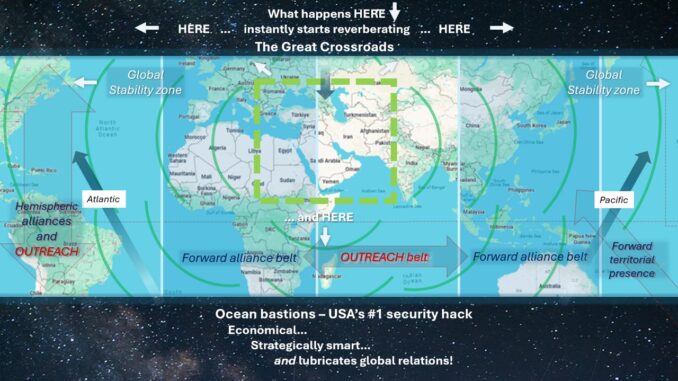Peloni: A very important analysis by J.E. Dyer. Highly recommended.
This fight must be to win.
J.E. Dyer, a retired Naval Intelligence officer, blogs as The Optimistic Conservative.
July 14, 2024

Even more “opening” caveat: As I prepare to post this article, former President Trump has just been shot at his rally in Butler, Pennsylvania. He appears to have been hit – grazed – just above his right ear. He got up on his own, fist pumped the crowd, and went offstage surrounded by his Secret Service escort.
Trump being shot at is fresh and powerful evidence that the war on both the U.S. and Israel is being fought for keeps. This isn’t a war to preserve the status quo. The aggressor-opponent is fighting to take down the stabilizing, freedom-protecting power of both nations. With all their warts, Trump and Netanyahu are the men whose guiding hands the enemy wants to eliminate.
Please keep that in mind as you ponder the peremptory, take-no-prisoners nature of the non-lethal measures I propose in this article: measures to ensure Israel doesn’t have to wage a “fair fight” alone. We’re not in a situation of stability now. Stability has already been breached. Fighting to a draw isn’t an option. This fight must be to win.
Update: It’s now 14 July, and I assume readers are as caught up as they want to be on the attempt against Trump. I will pause only to be thankful that he survived, apparently by a miracle. My prayers go up for the family of Corey Comperatore, a fireman and former fire chief who was killed by one of the shots from the shooter, Thomas Matthew Crooks. He left behind a wife of over 20 years and two daughters.
Opening caveat (original): Yes, I know the U.S. under Joe Biden could not execute any of this in any use of mere natural, observable conditions. Please don’t bother making that point. I wouldn’t trust Biden’s team to execute it. Nevertheless, we need the bracing touchstone of what could be done, and afterwards what could have been done. We are in an extraordinary situation at the moment, and ordinary thinking must not drive our conclusions about it. If we think “Biden” is an executive entity equipped as and reacting like other post-World War II American presidencies, our starting point is wrong and everything else will be too. The suggestions for American policy here are not what Biden could do, but what America could do, with different leadership.
Never lose sight of the difference.
It’s an excellent axiom to never put your citizen soldiers into a fair fight if you can help it. To the extent preparations, planning, and timing are up to you, you should always seek the maximum advantage going into war. This doesn’t just spare your own people’s lives. It spares the opponent’s death toll as well, both military and civilian. The greater the initial advantage, the faster a war can be won, if the will is there to do it. Where military advantage prevails quickly, the grim toll of attritional stalemates and the pile-up of fatalities can be minimized.
Israel, I propose, should not have to be in a fair fight with Hezbollah in Lebanon, and the U.S. could help.
The Canada-based site Honest Reporting, which offers news and opinion from a pro-Israel perspective, on 20 June 2024 published a feature article on the topic “What All-Out Israel-Hezbollah War Would Look Like.”
Honest Reporting cited a study done of the matter by Reichman University’s (Herzliya, Israel) International Institute for Counter-Terrorism (ICT). The study was reportedly presented to Israeli officials in 2023, in the weeks before the 10/7 attack by Hamas, and was compiled with the participation of the IDF as well as other government officials.
In the interest of focusing on my own main topic, I commend to readers, as usual, the links and their ancillary links for additional reading. The study and its summarizers present a discouraging worst-case picture: one that is feasible, and must be considered (as the most Israel should be prepared for), even if Hezbollah probably couldn’t execute all of it as perfectly as the accounts suggest.
I do note that the most irreducible problem previewed for Israel in the study – if it goes unaddressed – is the enormous inventory of missiles, rockets, and drones Hezbollah can now marshal against Israel. It is accurate to say that at some point, fairly early on, Hezbollah by itself could overwhelm Israel’s defense systems and inventory on hand. If Iran joined the barrage, it would happen faster.
I also stipulate here that, yes, it is increasingly inexplicable that so much prior development had been done of scenarios like the one that unfolded on 10/7/2023, and so much observation and intelligence on Hamas’s activities before the attack was reportedly available, and yet Israel was caught flat-footed. That’s not the subject of this article, so I will note it and move on.
The tight focus here is on what the U.S. could do, if we had the will to execute properly, to deter Hezbollah, Iran, and Iran’s other clients (e.g., the Houthis, the Iraqi militias, and what’s left of Hamas), while helping shape the battlespace conditions to Israel’s advantage. Everything could be done with no U.S. boots involved in the fight on the ground. (In that regard, however, it would behoove us to make our defenses adequate at U.S. base locations in Iraq and Syria, and be prepared for counterstrikes, on a level we haven’t punched at before, in case of Iran-backed attacks. Prepare in advance to dish it out, not take it.)
We ought to want to do both of those things: deter and shape. Israel, a fellow consensual democracy with shared values, is our close partner; its security is gravely at risk; and Israel is clearly the responsible status quo power in the mix. Israel wants to establish a stable security situation on its perimeter when it’s all over. The Israeli government and people have no desire to see instability spread, to enlarge or even change borders, or assault the interests of other regional nations.
Iran and its terrorist proxies want the opposite. They want regional instability for Iran to take advantage of. Iran, Hezbollah, Hamas, and even the PA, with its roots in Fatah, want arrangements that will so imperil Israel’s security and viability that Israel will fall, and be no more. Iran’s regime is not just willing but determined to change the political lordship and orientation of as much territory as necessary in the “Great Crossroads,” to bring about that end; e.g., with a land-bridge to the Mediterranean.
 The nexus of the Great Crossroads, on a map I first used in 2009 in an article entitled “Charging the Chokepoints.” MSN Encarta map; author annotation.
The nexus of the Great Crossroads, on a map I first used in 2009 in an article entitled “Charging the Chokepoints.” MSN Encarta map; author annotation.
Iran wants to flank Israel on the north and the south, by establishing military presence, starting with proxy presence, in Iraq, Syria, Lebanon (the three-border land-bridge), and Yemen. Iran wants to exercise an armed veto from shore over the use of the Red Sea. The Houthis are Iran’s little helpers on that. But in the last 20 years, Iran has also come and gone and come again in Sudan, Somalia, and Eritrea. Rinses and repeats are guaranteed as long as the U.S. and our regional partners are slow to counter those moves.
 This map, first produced in 2015, doesn’t require significant updating from 2018. These are still the vectors Iran is actively moving on. Google map; author annotation.
This map, first produced in 2015, doesn’t require significant updating from 2018. These are still the vectors Iran is actively moving on. Google map; author annotation.
If a special political and cultural affinity with Israel isn’t enough justification for the U.S. to support and empower Israel, these pragmatic security concerns make up any deficit. The balance and stability of the Great Crossroads can’t be breached without rapid reverberations throughout all U.S. security pillars at either end of the Afro-Eurasian land mass. In a shrinking world, the importance of those guarded perimeter gateways to the reliance of our ocean bastions is more, not less immediate than ever. And as we’ve seen with the Houthis in the Red Sea, local breaches instantly affect global trade, the bread and butter of American prosperity.
 Visualization of how the U.S. sets a perimeter for our ocean bastions with forward alliances and outreach efforts for power-balancing beyond the alliance belts. The Great Crossroads is a critical node – for some purposes the critical node – in the world’s modern geopolitical “system.” Nothing that happens there fails to affect our interests. For additional discussion of U.S. geopolitical arrangements in the Pax Americana era we’ve just left behind, here and here are good starters. Google map, Pixabay background image; author annotation.
Visualization of how the U.S. sets a perimeter for our ocean bastions with forward alliances and outreach efforts for power-balancing beyond the alliance belts. The Great Crossroads is a critical node – for some purposes the critical node – in the world’s modern geopolitical “system.” Nothing that happens there fails to affect our interests. For additional discussion of U.S. geopolitical arrangements in the Pax Americana era we’ve just left behind, here and here are good starters. Google map, Pixabay background image; author annotation.
What happens with Israel, our other regional partners, and the Middle East as a whole is very much our business. Any error here would lie in imagining that we need to put boots on the ground to address every contributing situation. We don’t; and the suggestions below for what the U.S., even in a parlous state, is still the nation capable of undertaking, don’t entail putting our young men in the mud.
In no particular order – but starting with some key factors that are different from the fight in Gaza – here is a list. I note that this is not a comprehensive list. It leaves off virtually all the paperwork boilerplate about what the U.S. should be doing through “diplomacy.” That boilerplate typically robs diplomacy of its potential by assuming that it must be congenial, tentative, and ephemeral, as opposed to strong-willed, persuasive, and determined. Much of what’s in the list is diplomacy; it’s just not the Peter Pan-and-Tinkerbell diplomacy most auditors of that vitiated word usually have in mind.
The list is also simply not a complete list in any sense. I want to get this posted, not try to account for everything anyone sensibly thinks the U.S. should be doing. Failure to include the other measures readers can think of doesn’t mean I would exclude those measures. It means I want to emphasize the robust ones briefly introduced below.
Not Uncle Gaza
There are some key ways in which a fight with Hezbollah will not be like the fight in Gaza. One is the geopolitical reality that Gaza is a territory, not a recognized nation-state, and has been wholly governed by a basically post-legitimate terrorist organization. Significantly, Gaza’s borders and coastline exposure to the Mediterranean were already under the armed supervision of the IDF (and at one end, Egypt). Persistent third party interests were mainly those of the UN, longstanding and deeply compromised.
Lebanon, on the other hand, is a recognized nation-state with theoretical state sovereignty of its own and formal relations with most of the earth’s other nations. Hezbollah’s power in essentially holding that state over a barrel and dictating its course is of a different order from that of Hamas in Gaza. Lebanon, the nation-state, administers its own coastline and land borders. If the situation is not intervened in by an outside patron, that means Hezbollah is the administrator.
Iran’s influence in Lebanon is at the sufferance of the Lebanese government and its outside patrons, including the U.S.
Iran’s influence in Gaza has essentially been at Israel’s sufferance.
These features of the geopolitical landscape are actually good news, from at least one perspective. They mean that the U.S., as a chief patron of the Lebanese government – a patron that arrives regularly with boatloads of cash and arms – has influence on the situation and policies in Lebanon, if we will use it. I will propose below some ways of doing that, for a U.S. that wants Israel to win through to a better peace in an engagement with Hezbollah.
As a general note, when I speak of using our influence, I don’t mean sharing a candy bowl and making hopeless appeals to the non-Hezbollah elements of the Lebanese government.
I mean jerking the rug out from under the status quo that enables Hezbollah, and being ready to state and enforce what will meet our conditions, for those who’d like to see life continue with any degree of regularity and assurance (e.g., through U.S support of the LAF and our support of the premise behind UNIFIL). I mean being polite but ruthless, and sending whiners to the grief counselors we have assembled in Room 123 down the hall. Whether the whiners are in Lebanon, Brussels, Turtle Bay, Foggy Bottom, or the nosebleed floors of big international banks, they either “blow up” their support to Hezbollah, or we’ll blow it up for them.
It’s easily deduced that there’s a prominent implication here. The current status quo in Lebanon will not survive any war Hezbollah proposes to make on Israel. Israel can’t pry Hezbollah out of the Lebanese government. But, used correctly, and in quiet concert with our other partners in the region (I would start with the Saudis and Egypt; Turkey and Jordan have interests as well), U.S. power can. The limit of what can be done would be set by our own political courage, not by any immutable conditions.
Feature image: Fires caused by Hezbollah attacks in Northern Israel, early June 2024. Social media.



A very brilliant and thorough analysis of Israel’s extrordinarily difficult situation, and what could be done about it if there was a patriotic and competent administration in the U.S. Let us hope against hope that Trump will survive somehow the obvious conspiracy to assassinate him either before or after he becomes President. There is at least a real possibility that his admiistration would geve Israel the help it needs to win this war.
@Edgar: I would have answered your kind and thoughtful question about my health.
The reason I have delayed so long in replying to your inquiry about my health is that Israpundit and/or its login protocols only occasionally recognizes me as having “logged in.” When I am not described as logged in, I am shut out of the comments boxes, and also fromv ideos published on the site. I need to write to Ted and Peloni to fix this perblem
Many thanks, Edgar, for your expressions of concerns about my health. It means everything to me when my friends care about me, And I have always considered you to be one of my friends.
Unfortunately, I can’t report anything much positive about my health. I am more or less stable, but there has been no improvement. I am still struggling with my addiction to “bad” foods such as simple carbohydrates. So far I have not won this battle. I don’t understand my addiction, but it started when I was a young child, partly perhaps because my parents were determined to make sure that my brother and I were well fed. Probably fears about not getting enough food that they acquired from my grandparents, who were born in the “Old Country” (what is now called Ukraine)), where Jew and other people often went hungry.
Be that as it may, I have failed to overcome my compulsive overeating problem despite mamy failed attempts. As a result I am morbidly obese and in poor health. I have applied for certain government benefits from Medicaid, a government agency that pays for medical expenses fro qualifies{individuals. Government inspectors will be coming to visit me tomorrow (Thursday EDT) and again Frday to see if I qualify for medicaid benefits. As you can imagine I am on pins and needles worrying about whether i will be found to qualify. I really need this support if my health is to improve.
Concerning the other matter that you commented about, my having said I received private information from a friend about a public interest matter that you told me was “all over he internet,so I didn’t meed to rely on private information, my mind is a total blank. I can’t remember anything about what this issue was. Memory loss is one of the many problems that I am experiencing because of my various health conditions.
Many thanks, Adam.
Superb article analyzing what the US could, in a very realistic way, do to help Israel defeat Hezbollah, the Houthis, and Iran.
If Trump is elected we have 5 months in which Israel is not going to get comprehensive assistance from the US. Current policy makers are responding to the needs and desires of oligarchs who demand continued instability and never ending wars wherever on the globe that is possible, while at the same time they demand chaos and instability in the US. Their goals are the destruction of nation states. Their goals are psychopathic.
It is unclear how much time it will take the Trump administration to start putting foreign policy in place, but I hope the author of this article can get her analysis seen by the people Trump trusts to oversea Middle East policy.
If a democrat is elected, the outstanding plans put forth in this article will go nowhere: we will get more support for Iran and her proxies at Israel’s expense. It would be a disaster, at least from the perspective of Americans who are supportive of Israel.
On the other hand if Israel is forced to go it alone, she may develop her own resources and external sources for the kinds of weapons systems she needs to win this war, which would end up being a net positive for Israel. I would never underestimate Israel’s ability to succeed where no other country could.
Thanks to Israpundit for posting this thoughtful article about a muscular and successful path for winning for Israel, for America, and for the wider Middle East.